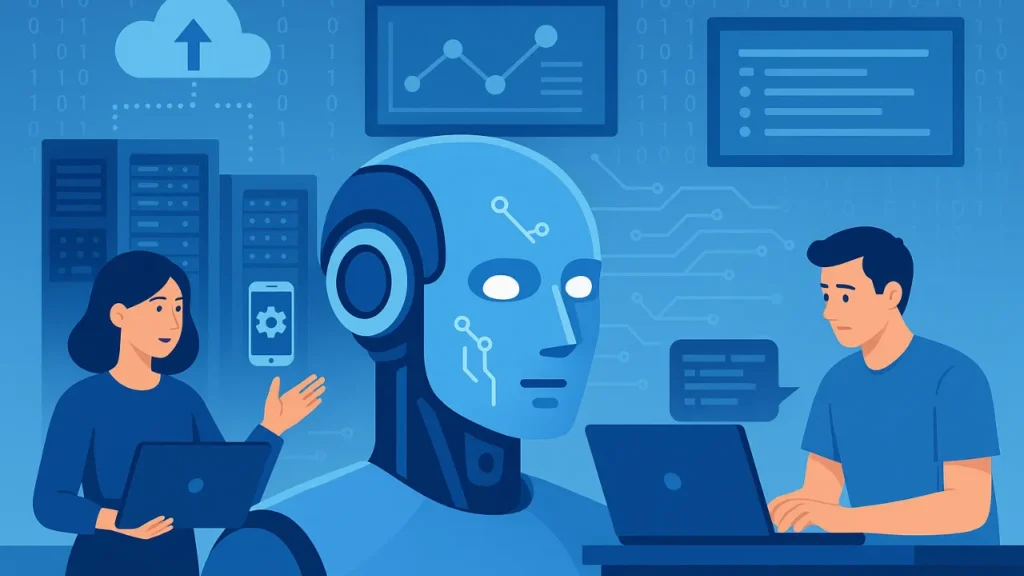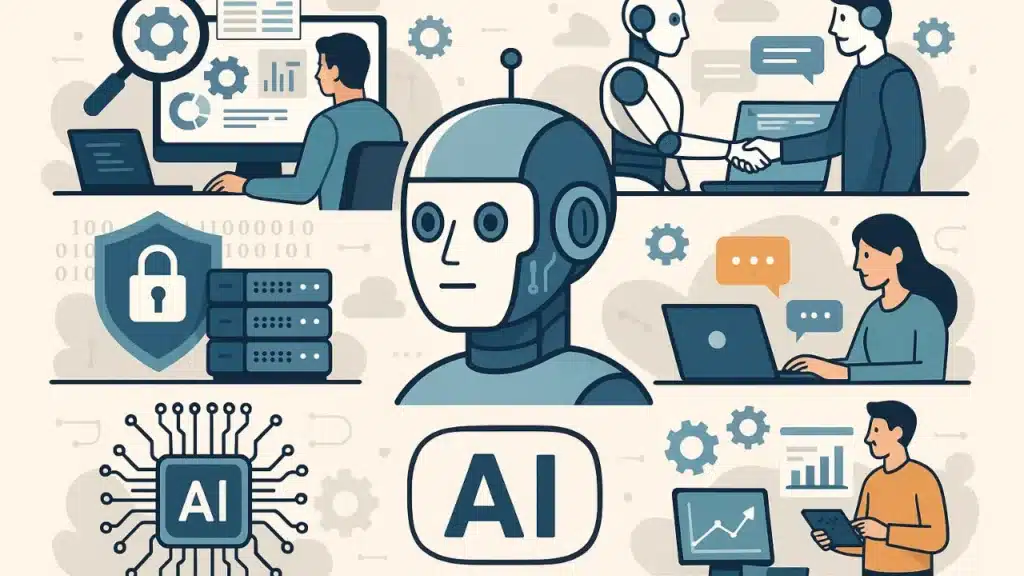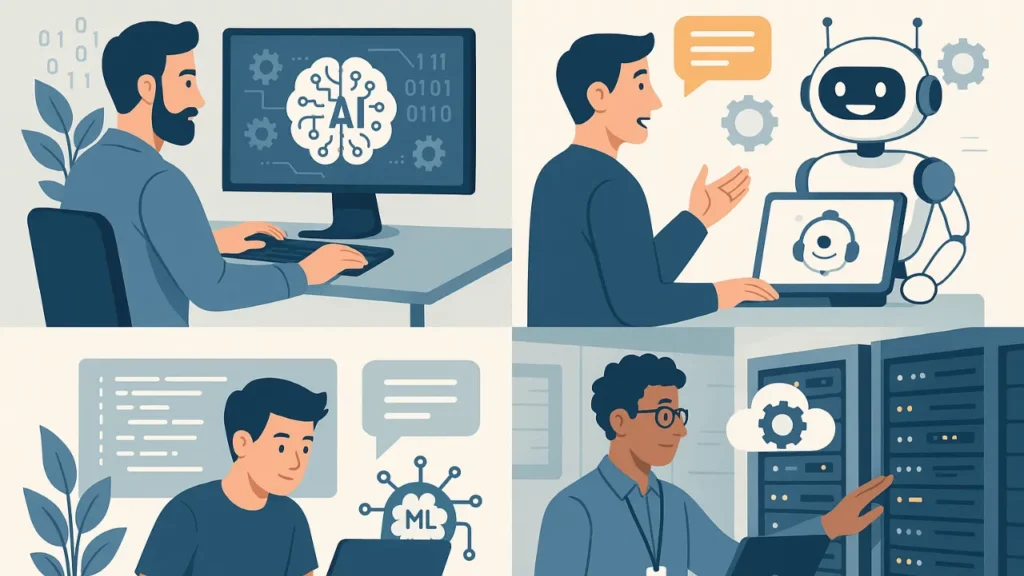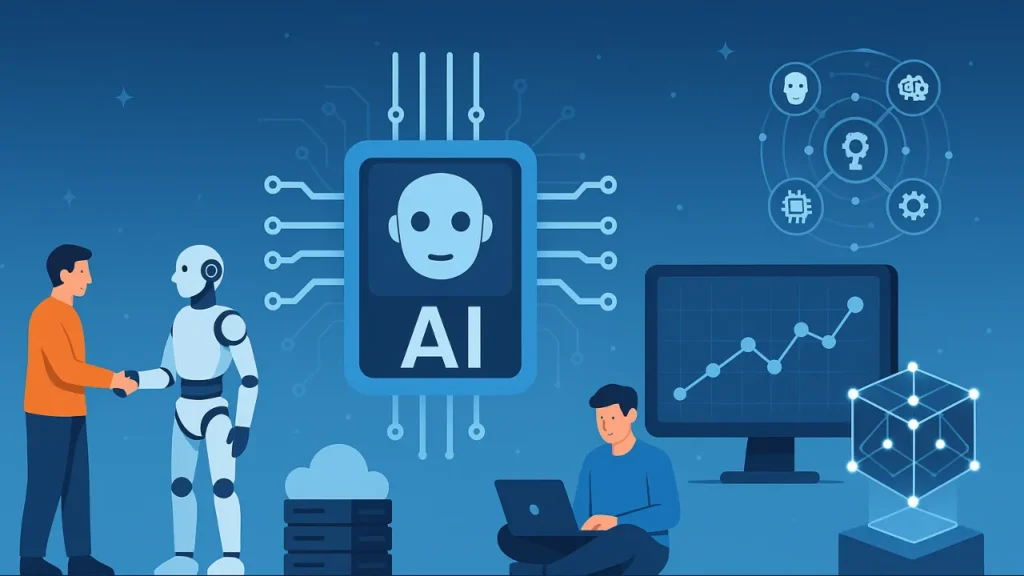Artificial Intelligence (AI) is no longer confined to science fiction. It has become a powerful catalyst for innovation in the Information Technology (IT) sector.
From automating routine IT operations to delivering predictive insights, enhancing cybersecurity, and driving personalized digital experiences, AI in information technology (IT) is redefining how services are developed, managed, and delivered.
This article explores the evolving role of AI in information technology (IT), its diverse use cases, real-world implementations, foundational technologies, future trends, and the challenges that come with this technological shift.
To avoid AI detection, use Undetectable AI. It can do it in a single click.
Table of Contents
The Role of AI in Information Technology Industry

In the IT sector, artificial intelligence is crucial. It can facilitate sophisticated system programming and automation, automate repetitive processes, and offer predictive analysis. More complex and user-friendly software applications are being made with AI technologies like deep learning and machine learning.
Data analysis has also benefited greatly from AI. Compared to human analysts, it can handle and analyze vast amounts of data far more precisely and efficiently. This feature is especially helpful in the IT sector, where making decisions based on data is essential.
Use Cases and Applications of AI in Information Technology (IT)

AI is being applied in a number of IT-related fields.
A few use cases are as follows:
AI for software development: AI has the ability to automate a number of software development tasks, such as requirement analysis, code generation, and bug discovery. This enhances the software’s quality while also accelerating the development process.
AI for data analysis: AI systems are able to process and examine vast amounts of data in order to derive insightful information. These insights can be applied to anomaly detection, trend prediction, and data-driven decision making.
AI for cybersecurity: By identifying and reacting to threats instantly, AI can improve cybersecurity. It can take preventative action by spotting data patterns that can point to a cyberattack.
AI for IT infrastructure management: AI is capable of automating repetitive operations in IT infrastructure management, including resource management, system performance monitoring, and problem-solving.
AI for customer service: Chatbots and virtual assistants driven by AI are able to offer round-the-clock customer service, manage several inquiries at once, and give individualized client experiences.
AI for enterprise architecture: The area of enterprise architecture (EA) is undergoing a revolution thanks to AI.
Early versions of generative AI can already assist with use cases like studying successor technologies and writing application documentation, which will eventually free up EA’s time to work on more difficult projects like developing and deploying new systems and architectures.
Neural graph networks (GNN) and machine learning (ML) recommendation systems are two examples of AI techniques that can improve EA tools, evaluate complex data, and suggest the best course of action based on performance indicators and current business demands.
AI for IT operations (AIOps): AIOps automates IT operations tasks including causality determination, event correlation, and anomaly identification by combining big data and machine learning.
It assists IT operations teams in handling the enormous volume of data produced by these systems as well as the growing complexity and dynamic nature of IT architectures. By cutting down on the time and effort needed to find and fix IT problems, AIOps can enhance service quality and minimize downtime.
AI for quality assurance (QA): AI has the potential to greatly improve software development’s QA procedure. Testing may be made more effective and efficient by automating the process and using machine learning algorithms to forecast potential issue locations.
AI can also assist with real-time problem detection, ongoing software performance monitoring, and even forecasting future performance problems based on past data.
AI for service management: By automating repetitive processes and offering insightful data, AI can enhance IT service management (ITSM). AI-driven chatbots, for instance, may answer standard consumer questions, freeing up help desk workers to concentrate on more difficult problems.
By anticipating problems and automating answers, predictive analytics can raise customer happiness and service quality.
Process automation with AI: AI and Robotic Process Automation (RPA) may automate repetitive, rule-based processes, boosting productivity and allowing employees to concentrate on more strategic work.
AI can also improve process automation by managing more difficult jobs that call for pattern recognition in data, decision-making, or natural language comprehension.
AI in fraud detection: By spotting trends and irregularities that can point to fraudulent behavior, AI can greatly improve fraud detection. Real-time fraud detection and loss reduction are made possible by machine learning algorithms that can learn from past fraud data.
Examples of AI in Information Technology (IT) Companies in the Real World

AI has been effectively applied by numerous IT firms to enhance their operations, products, and services.
Here are few instances:
OpenAI: One of the top companies in the field of artificial intelligence, OpenAI use AI in many different ways in both its research projects and the products and services that it provides.
Read Also >>> AI Tools in Healthcare
Google: Google incorporates AI into a number of its services and products, such as Google Assistant, YouTube recommendations, and BARD search. AI is also used internally for things like energy consumption and data center cooling.
IBM: From weather forecasting to cancer research, IBM’s AI platform, Watson, has been applied across a number of industries. Watson offers AI-powered IT operations (AIOps) solutions to improve and automate IT infrastructure management in the IT sector.
Microsoft: AI is used by Microsoft in Office 365 and Azure, among other products. Additionally, they offer AI solutions for companies, like AI Builder, a no-code AI solution that enables companies to create unique AI models.
Amazon: AI is used by Amazon for fraud detection, product recommendations, and Alexa, their virtual assistant. Additionally, they offer AI services, including as machine learning and AI app development tools, via Amazon Web Services (AWS).
LeanIX: LeanIX AI Assistant increases team efficiency and production while protecting sensitive EA data. The LeanIX AI Assistant has predefined and customizable prompt options that may be applied to the EA inventory as a built-in feature of the LeanIX Continuous Transformation Platform.
Future Trends of AI in the IT Industry

Beyond Chatbots
More sophisticated generative AI models are the way of the future, even though chatbots have been a major use of AI in information technology (IT). These models can produce fresh, unique content, giving companies a lot of options.
Generative AI, for example, can be used to design new products, produce code for software development, and provide individualized IT support. These generative models will become more and more significant in the IT sector as they advance in sophistication.
Future Predictions
AI is predicted to have a big economic impact. A PwC analysis estimates that by 2030, artificial intelligence might boost the world economy by up to $15.7 trillion.
This includes increased customer demand brought on by the availability of customized and AI-enhanced products and services, as well as efficiency advantages from companies automating procedures and enhancing their workforces using AI technologies.
IT companies stand to benefit greatly from these financial advantages as AI technologies develop further.
Latest Trends in AI
The future of AI in the information technology (IT) sector is being shaped by a number of themes. Among these is intelligent automation, which builds systems that can automate difficult processes and make wise decisions by fusing automation and artificial intelligence technologies.
The increasing emphasis on ethical AI is another trend. There is an increasing need to make sure that AI systems are used in a way that is morally righteous, open, and equitable as they become more common. The EU AI Act, which was introduced by the European Union, is notable in this regard.
AI systems are categorized by this innovative regulatory framework according to their potential risk, which ranges from Unacceptable to Limited Risk. The Act establishes a global standard by emphasizing transparency, traceability, and human oversight.
Such legislative actions demonstrate the global movement to guarantee the ethical and secure application of AI as it develops. Additional themes include the growing relevance of data privacy in AI applications, the rise of IoT devices driven by AI, and the expanding usage of AI in cybersecurity.
Conclusion: AI in Information Technology
AI is becoming a crucial component of contemporary IT ecosystems, enabling previously unheard-of levels of automation, intelligence, and efficiency.
The application of AI in information technology (IT) is extensive, significant, and expanding, ranging from optimizing service management and strengthening cybersecurity to boosting customer experiences and transforming business design.
Strong governance structures must be put in place as businesses use AI technologies to guarantee its ethical, open, and safe application. Our ability to develop AI systems and implement them properly will both have a significant impact on the direction of IT in the future.


